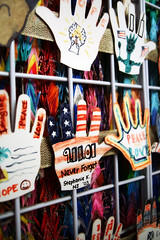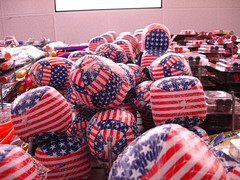Berea won't know what hit it...
Our new view. (Welcome home.)
[Berea photostream]
We're Here
Response to the Iraq Veterans Memorial
(Another response for the Peace Studies class. Site referenced is the Iraq Veterans Memorial. From the site: "The Iraq Veterans Memorial is an online war memorial that honors the members of the U.S. armed forces who have lost their lives serving in the Iraq War. The Memorial is a collection of video memories from family, friends, military colleagues, and co-workers of those that have fallen.")
--
My cousin left for Iraq in August. My mother's half-sister (his mother) relays me e-mails about his state of being; as I read them, I realize just how little I know about him. I was always closer to his younger sister, Meredith - when we were small, we girls would gang up against him in extended sibling rivalry, which usually involved one side barricading a door against the other. I would traipse about town and exchange clothes with Meredith, but I barely spoke to Jesse. Now, my mother asks me to help compile jokes and magazines for his care packages, but I have no idea what to include. What does he think is funny? What interests him? What sort of food does he like? What does he want to do with his life? What did he do on the weekends? And I wonder if I'll ever get another chance to know him.
War memorials can be strange things. The Iraq Veterans Memorial is different than most I've seen, and not just because it's online. The Vietnam War Memorial in Washington, D. C. - and, to a greater extent, our state one in Frankfort - attempt to make casualty statistics more personal by listing individual names instead of numbers. However, with these memorials, victims are still just names etched in cold stone. We still wonder what the people with those names were like, who knew them, and how they're remembered. The Iraq Veteran's Memorial does more than list names - it brings you face-to-face with the people behind the names and those who knew them; it shows you exactly who they were, what they looked like, what the faces of their friends and family in mourning look like. It also reinforces a detail many of us would rather not think about: That could be you.
I know more about the soldiers on the Iraq memorial website by watching a minute's worth of videos than I've known about Jesse my entire life. I can barely write him a letter - what would I put in a eulogy? I know full well how ill-prepared for that possibility I am. Too often we are fooled into thinking it won't be us, it won't be our friends or relatives or neighbors who won't come home. But it's always someone's - and they're not much different from us. What if we get the next blow?
Response to the Sixth Anniversary of 9/11
(Written for a section of my Peace Studies class.)
-- Yes, it's really been that long. Stop rhetorically asking, already. You know it's been that long. You can feel it. You can see it in our eyes - we're already weary of trying to summon the old heartache that just won't come anymore. We're weary of trying to remember what we were doing when we found out the news, making it the Kennedy Assassination on our generation's cultural timeline.
Yes, it's really been that long. Stop rhetorically asking, already. You know it's been that long. You can feel it. You can see it in our eyes - we're already weary of trying to summon the old heartache that just won't come anymore. We're weary of trying to remember what we were doing when we found out the news, making it the Kennedy Assassination on our generation's cultural timeline.
All the same, I discover myself still trying. I'm saddened, but not particularly surprised, to find that my memory's hazy, frayed, and fragmented. At times it resembles a threadbare and moth-eaten patchwork quilt. Maybe I'm holding on to it for sentimental value (could it be my security blanket?), but it could never have much practical use now.
What do I remember? I remember taking a break from my piano practice to go into the kitchen, and the kitchen TV was on. It had been several hours after it actually happened. The news was frenzied, and jumbled, and repetitive. My parents had to explain what was going on. They did so simply and to-the-point, although they were doubtlessly as clueless or confused as I was. My aunt Kathy (now buried somewhere in Monticello) called us about it, wondering if we knew, if the news was on here - that TV again. Was I numb then, or am I just numb now?
I remember feeling frightened for our Muslim neighbors, who lived at the corner of the cul-de-sac, whose younger children played games in the street with the others and whose older daughters walked to school in their headscarves and backpacks. I had been studying American history that year. I remembered all too well what had happened to the Japanese after Pearl Harbor fever. I remember a sudden blooming of red, white, and blue. Stars threatened to blind me; stripes reached to ensnare me in their candy-cane tentacles. (Maybe the Libyan family would have avoided harassment if they swathed their heads in Old Glories?) People set up booths outside of the mall, selling flags on dowel rods to "support the families of 9/11 victims." My mother bought a few. The money never got where it was supposed to.
I remember a sudden blooming of red, white, and blue. Stars threatened to blind me; stripes reached to ensnare me in their candy-cane tentacles. (Maybe the Libyan family would have avoided harassment if they swathed their heads in Old Glories?) People set up booths outside of the mall, selling flags on dowel rods to "support the families of 9/11 victims." My mother bought a few. The money never got where it was supposed to.
The first Sunday after, my mother insisted we go to church. We hadn't gone in months. Now, in her mind, it was "the right thing to do." I don't remember the service. I remember the sanctuary was packed, though. Did I listen? Was I fed propaganda; was I stirred by it? Did we fear judgment day - and who was supposed to be judging whom?
I remember our restaurant slowly losing business as people increasingly preferred to huddle in front of the television (that TV again!) than to get out of the house. We closed that restaurant after a year of struggle. My father now works for his former competitor.
I remember making an ungainly attempt to defend my beloved French from my then-best friend. I don't think either of us knew what we were talking about.
I remember being swept up in the patriotic tide like everyone else. I was snagged by a dissenting twig along the way, though, and I'm grateful for it. I wish more branches took hold.
Six years later, and my memory fades by the day. Six years later, and we speak of "cultural amnesia." Given how little we knew in the first place, I doubt it would do us much good to remember. Meanwhile, the future keeps coming - and we keep trying, instead of rebuilding. Where do we go from here?



